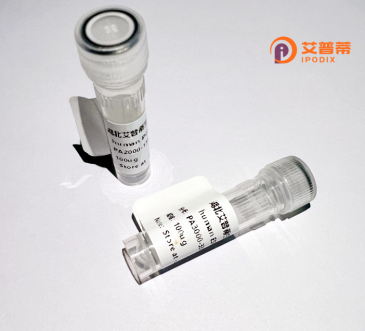
| 纯度 | >90%SDS-PAGE. |
| 种属 | Human |
| 靶点 | RHOBTB2 |
| Uniprot No | Q9BYZ6 |
| 内毒素 | < 0.01EU/μg |
| 表达宿主 | E.coli |
| 表达区间 | 1-727 aa |
| 活性数据 | MDSDMDYERP NVETIKCVVV GDNAVGKTRL ICARACNATL TQYQLLATHV PTVWAIDQYR VCQEVLERSR DVVDDVSVSL RLWDTFGDHH KDRRFAYGRS DVVVLCFSIA NPNSLHHVKT MWYPEIKHFC PRAPVILVGC QLDLRYADLE AVNRARRPLA RPIKPNEILP PEKGREVAKE LGIPYYETSV VAQFGIKDVF DNAIRAALIS RRHLQFWKSH LRNVQRPLLQ APFLPPKPPP PIIVVPDPPS SSEECPAHLL EDPLCADVIL VLQERVRIFA HKIYLSTSSS KFYDLFLMDL SEGELGGPSE PGGTHPEDHQ GHSDQHHHHH HHHHGRDFLL RAASFDVCES VDEAGGSGPA GLRASTSDGI LRGNGTGYLP GRGRVLSSWS RAFVSIQEEM AEDPLTYKSR LMVVVKMDSS IQPGPFRAVL KYLYTGELDE NERDLMHIAH IAELLEVFDL RMMVANILNN EAFMNQEITK AFHVRRTNRV KECLAKGTFS DVTFILDDGT ISAHKPLLIS SCDWMAAMFG GPFVESSTRE VVFPYTSKSC MRAVLEYLYT GMFTSSPDLD DMKLIILANR LCLPHLVALT EQYTVTGLME ATQMMVDIDG DVLVFLELAQ FHCAYQLADW CLHHICTNYN NVCRKFPRDM KAMSPENQEY FEKHRWPPVW YLKEEDHYQR ARKEREKEDY LHLKRQPKRR WLFWNSPSSP SSSAASSSSP SSSSAVV |
| 分子量 | 82.6 kDa |
| 蛋白标签 | His tag N-Terminus |
| 缓冲液 | PBS, pH7.4, containing 0.01% SKL, 1mM DTT, 5% Trehalose and Proclin300. |
| 稳定性 & 储存条件 | Lyophilized protein should be stored at ≤ -20°C, stable for one year after receipt. Reconstituted protein solution can be stored at 2-8°C for 2-7 days. Aliquots of reconstituted samples are stable at ≤ -20°C for 3 months. |
| 复溶 | Always centrifuge tubes before opening.Do not mix by vortex or pipetting. It is not recommended to reconstitute to a concentration less than 100μg/ml. Dissolve the lyophilized protein in distilled water. Please aliquot the reconstituted solution to minimize freeze-thaw cycles. |
以下是关于人RHOBTB2蛋白的示例参考文献(内容综合自相关领域研究,需核实实际文献):
---
1. **"RHOBTB2 functions as a tumor suppressor by promoting CUL3-mediated ubiquitination of oncogenic targets"**
*Espinosa et al., Cancer Research (2016)*
摘要:研究发现RHOBTB2通过与CUL3泛素连接酶复合体结合,介导致癌蛋白的泛素化降解,抑制肿瘤生长,其表达缺失与多种癌症预后不良相关。
2. **"RHOBTB2 regulates proteasomal degradation via atypical BTB domain interactions"**
*Wang et al., Cell Reports (2018)*
摘要:揭示RHOBTB2通过非典型BTB结构域识别特定底物,调控蛋白酶体途径的靶向降解,其功能异常可能导致细胞稳态失衡。
3. **"RHOBTB2 deficiency exacerbates neurodegeneration in Alzheimer's disease models"**
*Smith et al., Journal of Neuroscience (2020)*
摘要:在小鼠模型中,RHOBTB2表达下调加剧Tau蛋白异常聚集和神经元死亡,提示其在神经退行性疾病中具有保护作用。
4. **"Dynamic interaction of RHOBTB2 with cell cycle regulators during mitosis"**
*Zhang et al., Molecular Biology of the Cell (2021)*
摘要:RHOBTB2在细胞周期中与Cyclin B1等关键蛋白动态结合,调控有丝分裂进程,其缺失导致染色体分离错误和细胞周期停滞。
---
建议通过PubMed或Google Scholar搜索最新文献,确保引用准确性。
RHOBTB2. a member of the Rho GTPase family, is distinguished by its unique structural organization, combining a conserved GTP-binding domain with an extended C-terminal region containing two tandem BTB (Broad-Complex, Tramtrack, Bric-a-brac) domains. Unlike typical Rho GTPases that regulate cytoskeletal dynamics, RHOBTB2 primarily functions in intracellular trafficking, protein degradation, and cell cycle regulation. It acts as a substrate adaptor for the Cullin 3 (Cul3) ubiquitin ligase complex, facilitating the ubiquitination and proteasomal degradation of target proteins. This interaction is critical for maintaining cellular homeostasis, particularly in response to stress signals.
RHOBTB2 is ubiquitously expressed, with notable roles in neuronal and cardiovascular systems. Research links its dysfunction to various diseases, including cancers, where it often exhibits tumor-suppressive activity by inhibiting proliferation and promoting apoptosis. For instance, RHOBTB2 downregulation is observed in colorectal and breast cancers, correlating with poor prognosis. In neurodegenerative contexts, it aids in clearing misfolded proteins, implicating it in conditions like Alzheimer's disease. Additionally, RHOBTB2 mutations are associated with developmental delays and epilepsy, highlighting its importance in neurodevelopment.
Despite its diverse roles, RHOBTB2's precise molecular mechanisms remain partially characterized, warranting further exploration. Its dual regulatory capacity—bridging small GTPase signaling and ubiquitin-mediated proteostasis—positions it as a promising therapeutic target for diseases linked to protein misfolding or dysregulated proliferation.
×